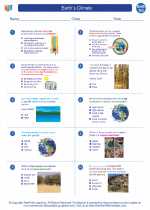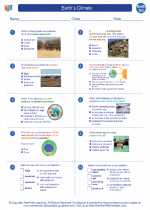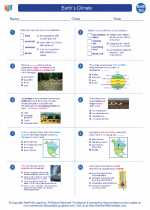Environmental Conditions
Environmental conditions refer to the physical, chemical, and biological factors that influence the health, growth, and survival of living organisms within a particular ecosystem. These conditions can include factors such as temperature, humidity, light, air and water quality, and the presence of other living organisms. Understanding the environmental conditions of a particular area is crucial for understanding how ecosystems function and how human activities can impact the natural world.
Key Concepts
1. Temperature: The average temperature of an area can have a significant impact on the types of organisms that can thrive there. Different organisms have different temperature tolerances, and extreme temperatures can be harmful or even fatal to certain species.
2. Humidity: The amount of moisture in the air can affect the ability of organisms to regulate their internal water balance. High humidity can make it difficult for some organisms to cool down, while low humidity can lead to dehydration.
3. Light: The availability of light, as well as the quality of light (e.g., full spectrum, UV, etc.), can influence the growth and behavior of plants and animals. Photosynthesis, the process by which plants convert light energy into chemical energy, is a crucial biological process that depends on the availability of light.
4. Air and Water Quality: The presence of pollutants, toxins, and other contaminants in the air and water can have harmful effects on the health of organisms. Monitoring and maintaining high air and water quality is essential for the well-being of ecosystems and human populations.
5. Presence of Other Organisms: The interactions between different species within an ecosystem can have profound effects on the overall health and balance of the ecosystem. Predation, competition for resources, and mutualistic relationships are all examples of how the presence of other organisms can shape environmental conditions.
Study Guide
When studying environmental conditions, it's important to understand the interconnectedness of different factors and how they influence the overall health of an ecosystem. Here are some key points to focus on:
- What are the primary environmental factors that influence the distribution of organisms in different ecosystems?
- How do changes in temperature and precipitation patterns affect the balance of ecosystems?
- What are some examples of human activities that can disrupt natural environmental conditions, and what are the potential consequences of these disruptions?
- How do organisms adapt to different environmental conditions, and what are the limits of their tolerance?
- What are some strategies for monitoring and managing environmental conditions to protect the health of ecosystems and human populations?
By exploring these questions and understanding the fundamental principles of environmental conditions, you can develop a deep appreciation for the delicate balance of nature and the importance of preserving healthy ecosystems for future generations.
.◂Earth Science Worksheets and Study Guides High School. Earth`s Climate

 Worksheet/Answer key
Worksheet/Answer key
 Worksheet/Answer key
Worksheet/Answer key
 Vocabulary/Answer key
Vocabulary/Answer key
 Vocabulary/Answer key
Vocabulary/Answer key
 Vocabulary/Answer key
Vocabulary/Answer key
